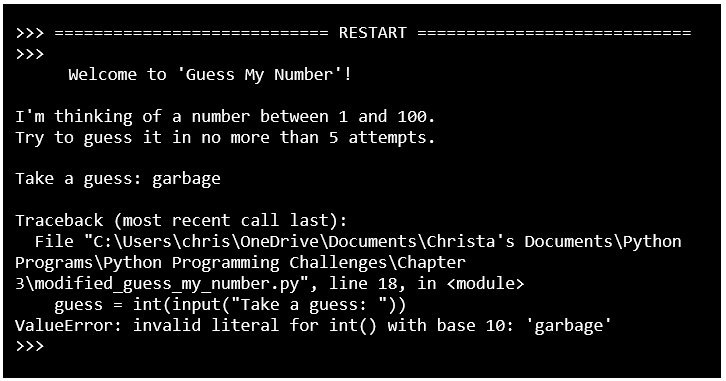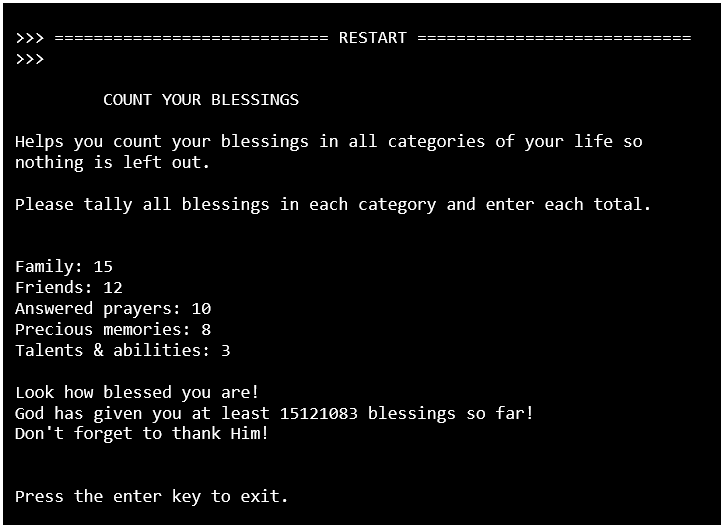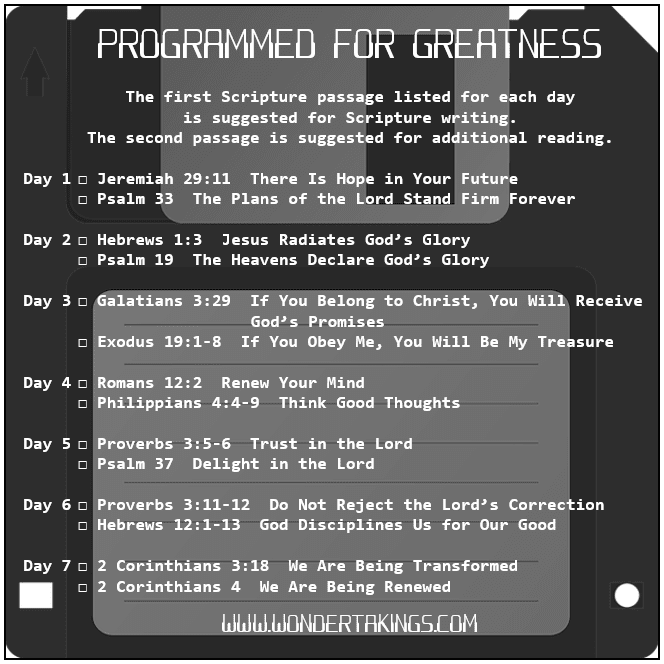Programmed for Greatness
“God has made us what we are. In Christ Jesus, God made us to do good works, which God planned in advance for us to live our lives doing.”
Ephesians 2:10 NCV

As a kid in the 80’s and as an undergrad. in the early 90’s, I enjoyed learning computer programming. In fact, I mentioned to my son-in-law one day how satisfying it was writing columns of hexadecimal code in my assembly language programming classes, and he said, “You’re such a nerd!” Yes. Yes, I am. However, I didn’t pursue programming after college, so I don’t remember as much about it as I would like. A few years ago, hoping to pick it up again, I purchased a beginner’s guide to programming in the Python language and began going through a few of the lessons. My older daughter has recently taken an interest in it as well, so I was inspired to give this week’s post a “computer programming for beginners” theme. I hope you enjoy nerding out with me!
Hello World

“In the beginning God created the heavens and the earth.”
Genesis 1:1 NIV
One of the first things you learn when studying a new computer language is the “Hello World” program, which just prints “Hello World” on the screen. As Michael Dawson explains in Python Programming for the Absolute Beginner:
“The Hello World program is often the first program a beginner writes in order to dip his or her toe in a new language. It’s such a common first program that Hello World is an understood term in programming.”
Here’s what the program code looks like in Python:

This first lesson in programming reminds me of our first lesson in faith. God displays the basics of His divine nature through His creation. We can learn a lot about Him by simply looking around. Randy Alcorn says in Seeing the Unseen:
“To study creation is to study the Creator. Science should be worshipful discovery because the heavens and all creation declare God’s glory (see Psalm 19:1). God reveals His creative genius in flowers, waterfalls, animals, and planets. God’s character is written large in nature in His organization, skill, precision, and attention to detail. . . . in our own bodies and in our world we can see the intricacy of God’s craftsmanship; and in flowers and rain and art and music we see and hear vestiges of God’s beauty and creativity.”
“For ever since the world was created, people have seen the earth and sky. Through everything God made, they can clearly see his invisible qualities — his eternal power and divine nature. So they have no excuse for not knowing God.”
Romans 1:20 NLT
God shows us how amazing He is through what He has created. He could have made a boring, colorless world, but He didn’t. He created a universe full of wonders to show us who He is and what He is like. And He has pre-programmed each one of us with a longing for our Creator. We are designed to be in relationship with Him, and we will never feel happy or fulfilled apart from Him. Through His creation, He calls out to us “Hello world!” and waits for us seek Him.
If Statements

“If you declare with your mouth, ‘Jesus is Lord,’ and believe in your heart that God raised him from the dead, you will be saved.”
Romans 10:9 NIV
Since we are designed to be in relationship with God, we have a role to fulfill in God’s Kingdom. Before we were even born, God planned “good works” for us to do through life in Christ (Ephesians 2:10). But it’s up to us to choose to do them.
In computer programming, the “if” statement indicates code that will be executed only if certain conditions are met. Michael Dawson explains:
“Branching is a fundamental part of computer programming. It basically means making a decision to take one path or another. Through the if statement, your programs can branch to a section of code or just skip it, all based on how you’ve set things up.”
For example, here’s a section of code from a Python program that uses a random number generator to simulate flipping a coin. If the computer randomly generates the number 1, the program executes the code that instructs it to print “Heads.” If not, it bypasses that section of code and prints “Tails.”

This reminds me of the way God invites us into partnership with Him. He doesn’t force us into anything. He lets us choose the path we wish to follow. The Bible contains several “if” statements: If we choose faith in Christ, we will be saved (Romans 10:9). If we follow God’s commands, we will be His treasure (Exodus 19:5). If we believe, we will receive what we ask for (Matthew 21:22). If we trust in the Lord, He will guide our path (Proverbs 3:5-6). If we delight ourselves in the Lord, He will give us the desires of our heart (Psalm 37:4).
“If you believe, you will receive whatever you ask for in prayer.”
Matthew 21:22 NIV
God’s “if” statements are designed to draw us into a close, personal relationship with Him so that we can join Him in His work. To fully meet the conditions, we must know who God is and what He desires. They’re not just magic formulas to give us whatever we want. My Chronological Life Application Study Bible includes this note about Matthew 21:22:
“God does not grant requests that would hurt us or others or that would violate his own nature or will. . . . To be fulfilled, our requests must be in harmony with the principles of God’s Kingdom. The stronger our belief, the more likely our prayers will be in line with God’s will, and then God will be happy to grant them.”
Basically, God’s saying to us: “If you get to know Me and trust Me to guide you, I’ll lead you into the amazing life I have planned for you. If not, you will bypass the great things I have in store for you and you’ll never be satisfied.” So whether or not we have a life that fulfills all our deepest longings and desires is not left up to chance like the random flip of a coin. It’s a matter of choosing to follow God’s path for our lives.
GIGO

“For out of the abundance of the heart the mouth speaks.”
Matthew 12:34 ESV
Once we make the decision to follow God’s path, the real work begins. One of my favorite Scripture passages is Colossians 2:6-7 in The Living Bible paraphrase: “And now just as you trusted Christ to save you, trust him, too, for each day’s problems; live in vital union with him. Let your roots grow down into him and draw up nourishment from him. See that you go on growing in the Lord . . . . “ My father is a minister and often uses this as a benediction at the end of the worship service. I love it because it reminds us that God’s saving power is still at work in our lives every day, transforming us into the image of Christ Himself.
But we have to do our part, and this begins with learning to control our thoughts. There is a slang expression in coding known as GIGO which stands for “Garbage In, Garbage Out.” It means that no matter how good your program is, if the input is bad, you will get bad results. Here is an example: The simple program below asks the user to guess a number between 1 and 100. It is written to accept only numerical input. When I input the word “garbage” instead, it crashed the program and printed a bunch of, well, garbage. There is nothing wrong with the programming. It just wasn’t designed to accept the wrong type of input.

The same is true of us. God lovingly designed each one of us to live in vital union with Him and do the great things He has planned for us. But we are not programmed to function well with the wrong type of input. If we fill our minds with worries, fears, anger, bitterness, and desires contrary to God’s will, that garbage will come spilling out in our words and actions and may even crash our programming. On the other hand, if we fill our minds and hearts with the good things of God, our God-given programming will execute perfectly and we’ll become what we were always meant to be: God’s agents on earth. We will say and do things that draw others to Christ and help bring about God’s Kingdom. We will discover our true purpose, our true calling, and a sense of fulfillment and happiness that we never could have obtained on our own. It all begins with choosing to fill our minds and hearts with good things. My Chronological Life Application Study Bible has this note for Philippians 4:8:
“What we put into our mind determines what comes out in our words and actions. Paul tells us to program our mind with thoughts that are true, honorable, right, pure, lovely, admirable, excellent, and worthy of praise. . . . Replace harmful input with wholesome material. Above all, read God’s Word and pray. Ask God to help you focus your mind on what is good and pure. It takes practice, but it can be done.”
“In conclusion, my friends, fill your minds with those things that are good and that deserve praise: things that are true, noble, right, pure, lovely, and honorable.”
Philippians 4:8 GNT
Debugging

“Why do you call me ‘Lord, Lord,’ and not do what I tell you?”
Luke 6:46 ESV
Living the Christian life is a constant process of debugging — finding errors and correcting them. We have to trust our Programmer to help us do this every day. It is the job of the Holy Spirit living in us to transform us into the image of Christ. But this is not something that happens overnight. It is a lifelong process that will only be complete when Christ returns: “And I am sure of this, that he who began a good work in you will bring it to completion at the day of Jesus Christ” (Philippians 1:6 ESV). So this means we have to cooperate with the Holy Spirit every day as He does His important work. It’s not always fun, but it’s very necessary.
The “Count Your Blessings” program below was designed to accept numerical input and then add the numbers together to produce a total. But look carefully at the results:

Obviously, something’s not working right. The sum of 15, 12, 10, 8, and 3 is 48, not 15121083. Instead of adding the numbers, the program just stuck them all together. The program has some sort of bug. It’s not a bug that causes it to completely crash, but it’s something that needs to be fixed so that the program will operate the way it was supposed to. Michael Dawson explains what this type of bug is called:
“When a program produces unintended results but doesn’t crash, it has a logical error. . . . Logical errors can be the toughest bugs to fix. Since the program doesn’t crash, you don’t get the benefit of an error message to offer a clue. You have to observe the behavior of the program and investigate the code. In this case, the program’s output tells the story.”
It turns out that there was a step left out when setting up the variables in the “Count Your Blessings” program. To a novice programmer, it may have seemed like an unnecessary step that would have been extra work. So why bother? Well, the results speak for themselves. Without that important step, the program was renedered useless.
The same is true of us. We may think we have the Christian life down for the most part, but then the Holy Spirit leads us to do something we don’t understand. We go to church, we read our Bibles, we pray, but then He says, “Control your thoughts.” We think, Is that really necessary? It just seems like extra work. But if we don’t do what He says to do, the resulting logical error will produce results that we never intended. We let anger gain a foothold, and then we lash out at someone we love. We let discontentment settle in, and then we grow depressed. We fantasize about something we shouldn’t do, and then we find ourselves doing it. Maybe we don’t crash altogether, but we render ourselves useless for God’s Kingdom work. I know. I’ve been there. And I’m here to tell you that it’s no way to live.
Friends, we were programmed for greatness! We must trust Christ . . . not only to save us, but for each day’s problems. We must live in vital union with Him. This often means we will face discipline and correction. This is hard, sometimes really hard. But it is also really necessary. Randy Alcorn reminds us: “Because we were made for greatness, the world’s superficiality is unsatisfying. We ache for someone, somehow, to bring us lasting happiness. That someone is Jesus, and that somehow is His redemptive work.” Let’s let Him do His work. Only by letting God get all the bugs out of our programming will we be free to achieve the great things He has planned for our lives. Only then will we be fulfilled. Only then will we be truly happy.
“It is never fun to be corrected. In fact, at the time it is always painful. But if we learn to obey by being corrected, we will do right and live at peace.”
Hebrews 12:11 CEV
This week’s Scripture passages focus on instructions from our Programmer: Hello world, you are destined for greatness! If you trust Me, I will transform you and lead you into your hope-filled future! Just for fun, I have also included a debugged version of the the “Count Your Blessings” program below. Click “Run” to restart the program and then let it inspire you to restart your life today. No matter how many bugs we have in our code, God never gives up on us. He loves us and He blesses us every day because we were programmed for greatness. Let’s do our part to bring Him the glory He deserves!



“Yours is the mighty power and glory and victory and majesty. Everything in the heavens and earth is yours, O Lord, and this is your kingdom. We adore you as being in control of everything.”
1 Chronicles 29:11 TLB

References:
- Alcorn, Randy. Seeing the Unseen, Expanded Edition: A 90-Day Devotional to Set Your Mind on Eternity. Multnomah, 2017.
- Chronological Life Application Study Bible, New Living Translation. Tyndale House Publishers, Inc., 2012.
- Dawson, Michael. Python Programming for the Absolute Beginner. 3rd. ed., Course Technology, a part of Cengage Learning, 2010.
Images:
- Programming featured image by Gerd Altmann from Pixabay
- Floppy Disk image by OpenClipart-Vectors from Pixabay
- Creation image by beate bachmann from Pixabay (edited by me)
- Crosses image by Gerd Altmann from Pixabay (edited by me)
- Heart Flowchart image by me
- Error image by Clker-Free-Vector-Images from Pixabay (edited by me)
- Smiley Face image by me
Comment
Being an engineer and someone who also enjoys math, it may seem odd that I never liked programming. I hated my Fortran class at UT and barely got by with a “C”. However I really enjoyed your post today. Very creative how you connected programming with Christian faith and life. Thanks, Roddy
Thank you! : )